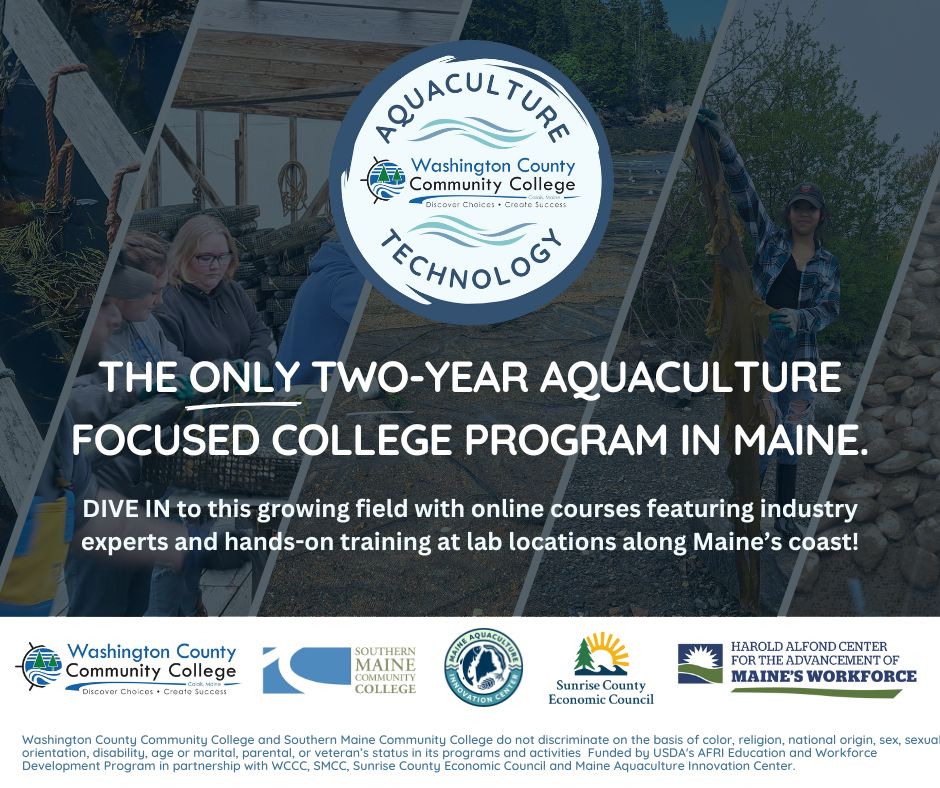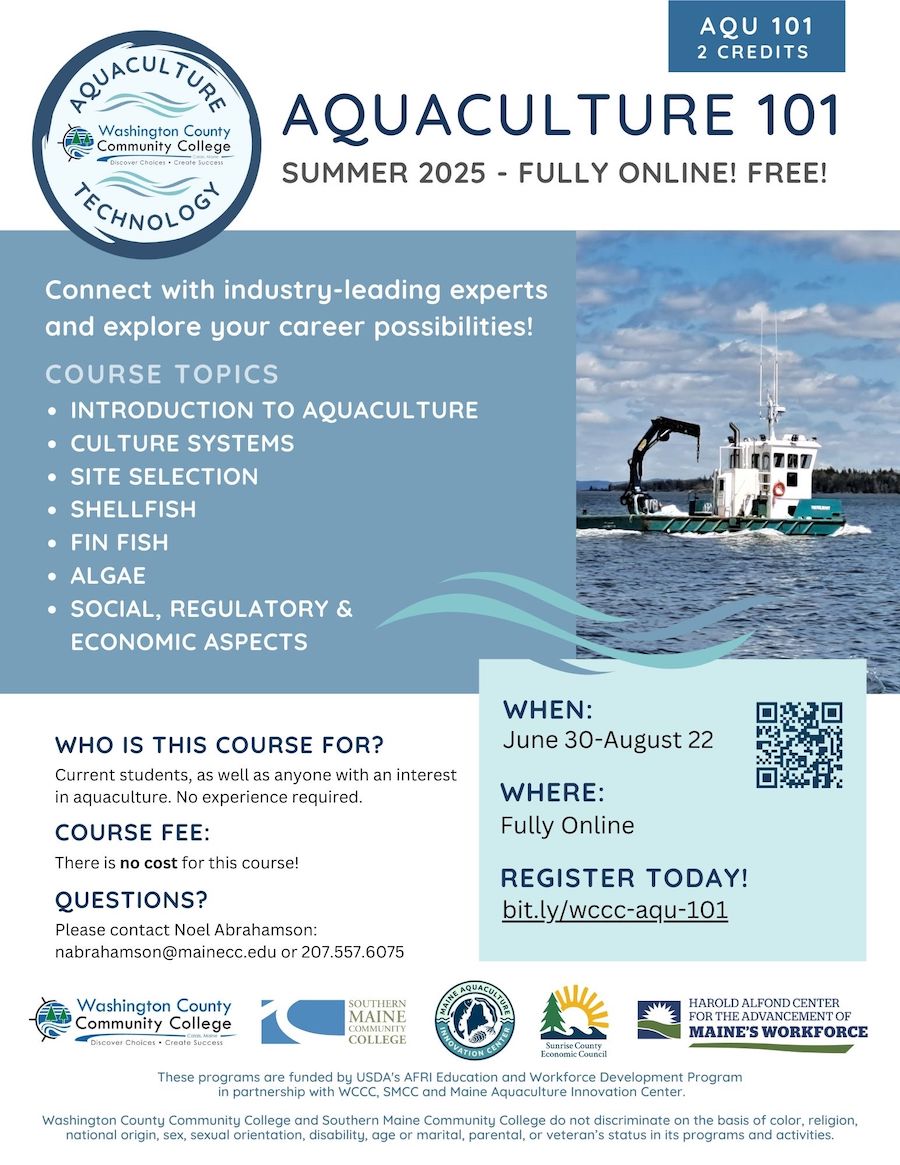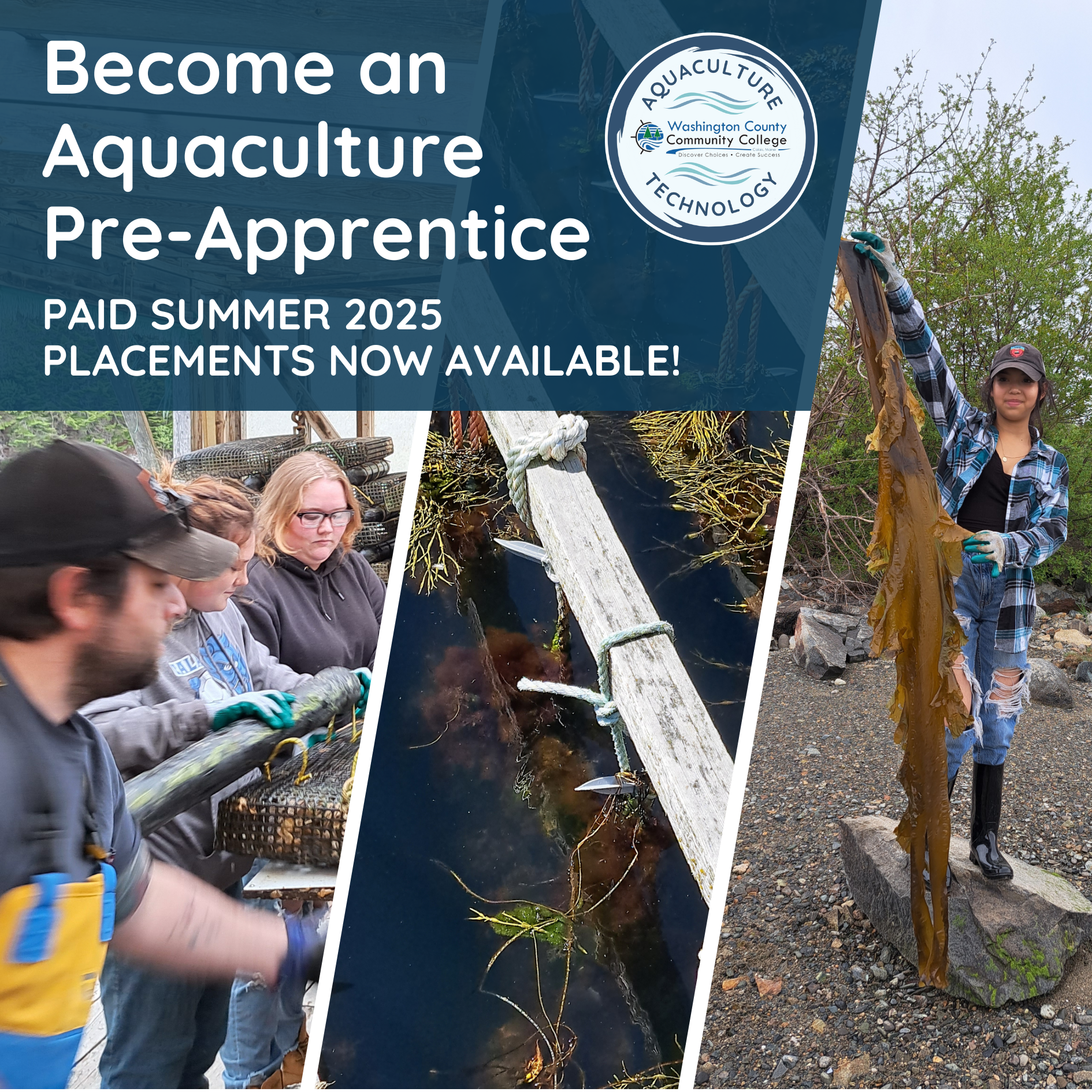Aquaculture Technology
Aquaculture Technology
Hybrid Program: Online Learning & Hand-On Labs
Choose your program:
Associates Degree – 63 Credits
Certificate – 31 Credits
Learn more about Summer 2025 Apprenticeships below
Interested in an individual course? Aquaculture 101 is open to all – and available at no cost! (see flyer below for details)
Summer 2025 Courses – REGISTRATION OPEN!
Aquaculture 101 – open to current students and the general public – Fully online and Free! – Register Here
________________________
Become an aquaculture pre-apprentice!
Paid positions available for Summer 2025!
Apply for a Summer 2025 Pre-Apprenticeship
Summer Work Placements in Aquaculture
Washington County Community College (WCCC) and the Maine Aquaculture Innovation Center (MAIC) are partnering to provide an 8-week pre-apprenticeship program for current or recently graduated high school students in Washington County.
This is a program for high school students (graduated 2022 – 2025, or entering grades 10, 11 or 12), which aims to:
A: provide hands-on work experience in aquaculture,
B: teach critical skills to prepare students for a career in aquaculture, and
C: introduce critical knowledge to prepare students for a career in aquaculture.
The program focuses on Washington County aquaculture operations, but may be open to Hancock County businesses and beyond.
LEARN WHILE YOU EARN:
Students will be paid $15 per hour. The number of hours per week will be set by your employer. Work placements will be 8 weeks.
WHAT WILL WCCC & MAIC DO?
MAIC will match students to host companies. WCCC will register you for the pre-apprenticeship program with the State of Maine. Please feel free to reach out to any of the people listed below if you have any questions:
Ready to apply for a Summer 2025 Apprenticeship?
Please contact Lori Joy, Coordinator of Apprenticeship Programs, WCCC
ljoy@mainecc.edu | 207-214-5064
Apply Now for a Summer 2025 Pre-Apprenticeship!
JOIN THE NEXT GENERATION OF THE AQUACULTURE WORKFORCE
Purpose: The Associate in Applied Science (AAS) degree in Aquaculture Technology is designed to develop a world class, industry-relevant and advised, training program that utilizes cutting-edge technology to prepare the next generation of aquaculture workforce. The AAS degree will:
- Prepare graduates for entry- and intermediate-level positions relevant to the Maine’s growing Aquaculture Industry.
- Prepare graduates with relevant experiential learning opportunities through highly developed and strategic industry partnerships, whereby lecture and in-person lab-based experiential learning occurs at partner locations across Maine’s coastal communities.
- Provide individuals already working in aquaculture the opportunity to upgrade their skills and knowledge base for career advancement with a college degree and an avenue to work toward more advanced degrees.
- Identify, and integrate opportunities for students to utilize appropriate cutting-edge technology and advanced data skills in their aquaculture learning experience.
- Provide the required classroom learning component for industry-led apprenticeship programs, sponsored by WCCC through both the Certificate and AAS programming.
- Be well-informed by partnership with industry experts to ensure responsive alignment with Maine’s Aquaculture Occupational Standards, other training programs and initiatives, and current and future workforce needs.
ENTER A HIGH GROWTH INDUSTRY
Program Educational Outcomes: Upon completion of the Associate in Applied Science degree in Aquaculture Technology, the graduate is prepared to:
- Identify and apply the basic theories, principles, and practices of the aquaculture industry: including language, regulations, and management practices for coastal and land-based operations.
- Review and practice the fundamental skills and techniques of aquafarming, including monitoring animal heath, growth rates, and accounting for environmental factors that affect productivity.
- Identify and analyze marine organisms, their evolutionary history, biogeography, anatomy, interactions with other organisms, adaptation to their environment and their impact on aquaculture.
- Identify and adhere to regulatory and safety protocols and standards in aquaculture operations.
- Evaluate career pathways in aquaculture, weighting the pros and cons, rewards, and demands to think critically and make informed decisions.
- Interpret water quality and chemistry’s role in animal and plant welfare and its influence on Maine’s key species production.
- Plan, develop and present a comprehensive biosecurity plan.
Career Opportunities: Graduates of the program will be qualified for positions such as Aquaculture Technician, Farm Technician, Hatchery Technician and Recirculating Aquaculture Technician.
_______________________________________________
Apply to the Aquaculture Technology Program Apply for a Summer 2025 Pre-Apprenticeship Learn More About the Industry of Maine Aquaculture






